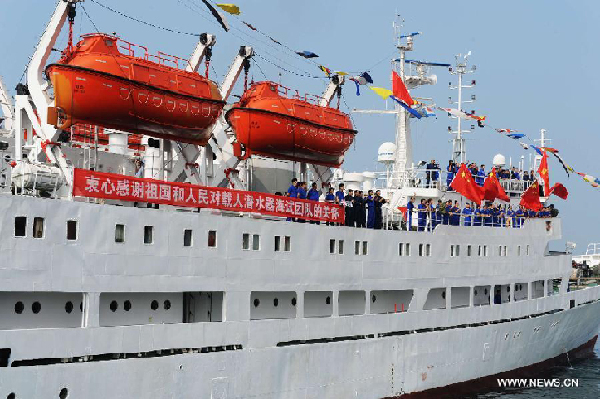Submersible Jiaolong may dive in South China Sea in 2013
 0 Comment(s)
0 Comment(s) Print
Print E-mail Xinhua, July 16, 2012
E-mail Xinhua, July 16, 2012
The Jiaolong manned submersible may undertake a deep sea dive mission in the South China Sea in 2013, a commanding officer of Jiaolong said Monday.
The sub, named after a mythological dragon, docked at the port of Qingdao in east China's Shandong Province on Monday after making a record dive of 7,020 meters below sea level in the Pacific Ocean's Mariana Trench during a 44-day test mission.
Liu Feng, field commander in chief, said a team is applying to take part in next year's mission.
"Their proposal is under an official appraisal. Once approved, it will mark Jiaolong's first mission since the dive tests," said Liu, who is also deputy head of the administrative office of the China Ocean Mineral Resources Research and Development Association.
He said the deep sea survey plan is aimed at obtaining first-hand data to aid in studies of the formation and evolution of the ocean basin.
Jin Jiancai, head of the administrative office of the association, said China is accelerating its deep sea research by setting up a national deep sea support base in Qingdao and building a new mother vessel for Jiaolong to succeed Xiangyanghong-9, which has extended its service for 34 more years.
Both of the projects are expected to be completed by 2015.
China plans to eventually build a deep sea station, where submersibles can dock undersea and oceanauts can stay for work, Jiaolong designer Fang Shujia said.
Liu said female candidates will be considered for next year's mission.
"Women tend to be more scrupulous and patient than men in deep sea missions, which are advantageous due to long hours of work in the sub's small cabin," Liu said.
He said psychological and physical qualities are the most important standards to consider when choosing oceanauts.
Cui Weicheng, deputy commander of the project and Jiaolong co-designer, said plans are in the works to develop another submersible that is able to dive up to 4,500 meters below sea level in the next stage of deep sea research.
"Most deep sea research can be completed by a sub with a diving capacity of 4,500 meters. It can cut operation costs by 40 percent in comparison to using Jiaolong," he said.
"Jiaolong had to complete as many as six dive operations during the Mariana dive tests, as well as deal with the undersea landscape and conduct surveys," said Xu Qinan, chief designer of Jiaolong.
Xu said the tests prove that the sub is able to operate in almost all diverse marine environments.
China started building Jiaolong in 2002. Built at a cost of 470 million yuan (74 million U.S. dollars), it conducted the first 1,000-meter dive test in 2009.
All of the sub's designs and core technologies were developed by Chinese scientists.
Jiaolong's successful tests in the Mariana Trench have allowed China to join the ranks of countries active in deep sea research. The United States, Japan, France and Russia currently lead others in the development of deep sea exploration technologies, each possessing their own submersibles and support bases.






